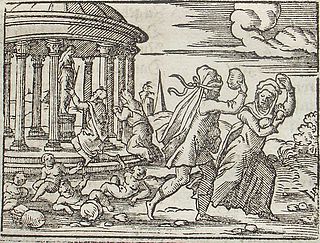Related Research Articles

Alpheus or Alpheios, was in Greek mythology a river and river god.

In Greek mythology, Pyrrha was the daughter of Epimetheus and Pandora and wife of Deucalion of whom she had three sons, Hellen, Amphictyon, Orestheus; and three daughters Protogeneia, Pandora II and Thyia. According to some accounts, Hellen or Helmetheus was credited to be born from Pyrrha's union with Zeus.
In Greek mythology, the name Chloris appears in a variety of contexts. Some clearly refer to different characters; other stories may refer to the same Chloris, but disagree on details.
In Greek mythology, Coeus, also called Polus, was one of the Titans, one of the three groups of children born to Uranus (Sky) and Gaia (Earth).
In Greek mythology, there were two women known as Philonoe or Phylonoe (Φυλονόη):
In Greek mythology, Olenus was the name of several individuals:
In Greek mythology, Elara, Elare or Alera, also called Larissa, was a mortal princess, the daughter of King Orchomenus and mother of the giant Tityos by Zeus. In some accounts, she was described as the daughter of Minyas instead.

Libya is the daughter of Epaphus, King of Egypt, in both Greek and Roman mythology. She personified the land of Ancient Libya in North Africa, from which the name of modern-day Libya originated.
The Clementine literature is a late antique third-century Christian romance or "novel" containing a fictitious account of the conversion of Clement of Rome to Christianity, his subsequent life and travels with the apostle Peter and an account of how they became traveling companions, Peter's discourses, and finally Clement's family history and eventual reunion with his family. To reflect the pseudonymous nature of the authorship, the author is sometimes referred to as Pseudo-Clement. In all likelihood, the original text went by the name of Periodoi Petrou or Circuits of Peter; sometimes historians refer to it as the "Basic Writing" or "Grundschrift".

Pamela Ann Clements, known professionally as Pam St Clement, is an English actress. She is known for portraying the role of Pat Butcher in the BBC soap opera EastEnders from 12 June 1986 until 1 January 2012, with a guest appearance in May 2016, thereby becoming one of the programme's longest-serving cast members.
In Greek mythology, Lysithea or Lysithoe (Λυσιθόη) may refer to the following women:

Edith Brown Clement is a senior United States circuit judge of the United States Court of Appeals for the Fifth Circuit, based in New Orleans, Louisiana.
Salamis was a nymph in Greek mythology, the daughter of the river-god Asopus
Eurymedousa or Eurymedusa is a name attributed to several women in Greek mythology.
In Greek mythology, Pandora was Phthian princess as the daughter of King Deucalion of Thessaly. She was named after her maternal grandmother, the more infamous Pandora.
In Greek mythology, Niobe was a daughter of Phoroneus and Teledice, the sister of Apis, and the mother by Zeus of Argus, who was the eponym of Argos. According to Acusilaus and the Pseudo-Clementine Writings she is also the mother of Pelasgus. She is not to be confused with the more famous Niobe, who was punished for boasting that she had more children than Leto.

Suzanne Clément is a Canadian actress. She is known for her work in Xavier Dolan's arthouse films I Killed My Mother (2009), Laurence Anyways (2012), and Mommy (2014).
Thebe is a feminine name mentioned several times in Greek mythology, in accounts that imply multiple female characters, four of whom are said to have had three cities named Thebes after them:
In Greek mythology, Chrysogeneia or Chrysogenia may refer to the two different individuals:
In Greek mythology, Megaclite was the daughter of Macareus, king of Locris and possibly the sister of Euboea. She was the mother of Thebe and Locrus by Zeus.
References
- Pseudo-Clement, Recognitions from Ante-Nicene Library Volume 8, translated by Smith, Rev. Thomas. T. & T. Clark, Edinburgh. 1867. Online version at theio.com